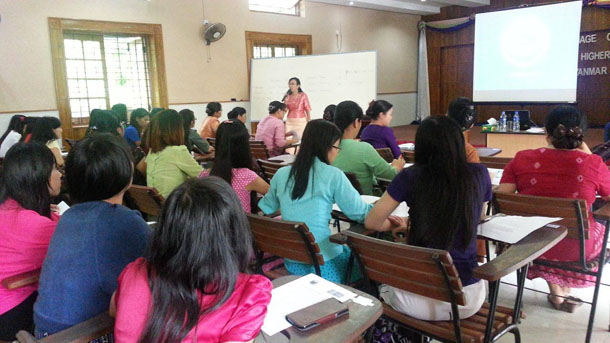RANGOON — Rangoon and Mandalay universities are increasingly wired to the outside academic world thanks to a program that is bringing access to scholarly literature at the institutions of higher learning, which languished for decades under Burma’s former military regime.
The universities’ faculty and students can now search and download a range of reputable international journals, databases and e-books free of charge under a program spearheaded by the Electronic Information for Libraries (EIFL) organization.
That is not to be taken for granted in Burma, where access to scholarly works has been limited for years, according to Kyaw Naing, pro-rector of Rangoon University. Under the previous junta, even if a student managed to outflank intensive Internet censorship and find an adequate connection amid notoriously slow broadband in Burma, simply paying for the academic content often proved an insurmountable hurdle.
“We have to buy some articles available online with credit card. Since international credit cards like MasterCard are not widely used here, even though the article is not so expensive, it was difficult for us to get the paper we wanted,” Kyaw Naing told The Irrawaddy.
“Because of the eLibrary service, we can access all journals available in the service free of charge. Before, we would have to ask a professor who lived abroad to help us find the paper we wanted and then send the PDF to us,” he said.
Since the service is based online, the technical network infrastructure and bandwidth at both universities have undergone upgrades since the project kicked off in December of last year.
The EIFL’s eLibrary Myanmar project is funded by the Open Society Foundations Higher Education Support Program, with two local coordinators providing training to faculty members and students on how to use the service over the course of 18 months.
“The University of Mandalay and the University of Yangon [Rangoon] have been quite isolated from the information world for many decades,” Susanna Lob, the manager of special projects with EIFL’s licensing program, told The Irrawaddy.
“Now, this is an opportunity for them to have the kind of library that Western universities would have—a very, very good quality online library which contains leading academic journals and a huge collection of electronic books,” she added.
Lob said plans to make the services available to more schools were limited by the inadequacy of existing network infrastructure, but the program hopes to add an additional three to four universities in a few months.
“There has been a huge demand from faculty to receive this training. They are queuing up to get the training,” Lob said. The training includes instruction in basic IT and research skills to instill the “information literacy” necessary to take full advantage of the access on offer.
“A key objective is to encourage the use of these resources in teaching and learning. First, people need to know which are the best journals in their field. And then they need to understand how to direct students, for example, to individual articles,” she continued.
“New skills are required to understand which are the best sources and to think critically about different perspectives.”
The collection of resources available through EIFL varies, from research on politics and physics to scholarly works on law and history. There are more than 10,000 full-text scholarly journals and more than 130,000 full-text academic e-books available.
“This is a first-time experience for them to search academic and scholarly articles and peer-reviewed articles. Those are the most important things in doing research, writing term papers, master’s theses and Ph.D.,” said Myat Sann Nyein, a local coordinator of the project for Rangoon University.
Lob said the new “eLibraries” represented nothing short of a sea change for the benefitting universities.
“It’s kind of going from a situation where books in the library are quite old and out of date, maybe there’s only one copy,” she said. “Now, overnight, there is unlimited access to a vast collection of e-books and journals.”

















